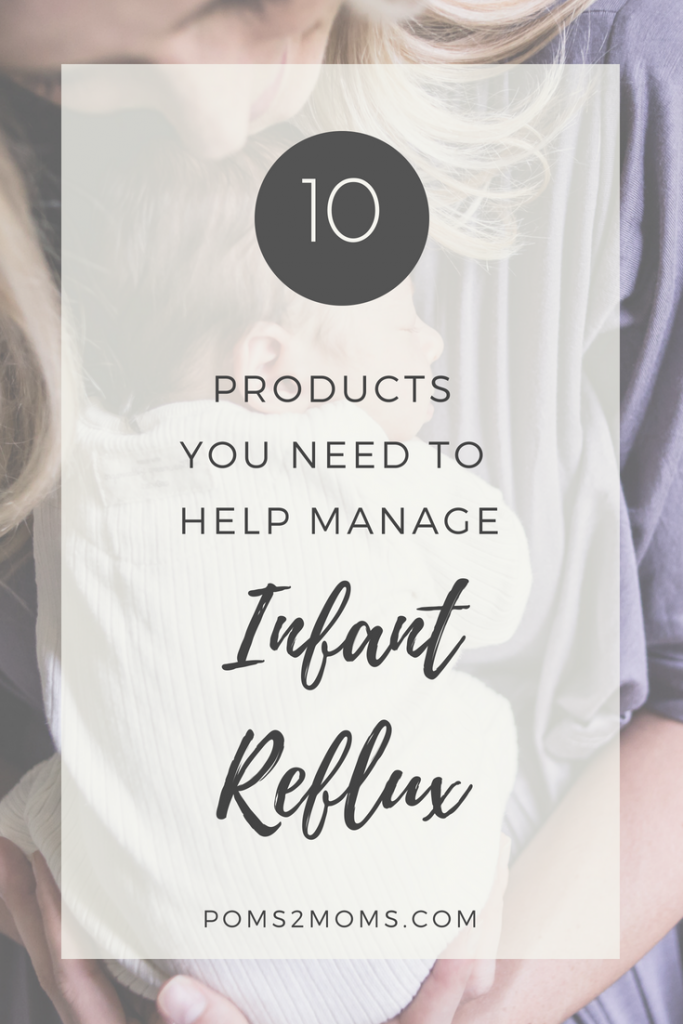The 5-Point Guide To Surviving Infant Reflux

If you’ve stopped by the blog lately, you know there are a lot of heartstrings being pulled as we reminisce about the little ones growing up.
Firsts. Lasts. There are so many sweet memories during infancy that it got me thinking about the things I didn’t miss.
You know what was a real pain in the ass? Infant Reflux.

[ReviewDisclaimer]
I vividly remember standing in the hotel lobby in Georgetown, Texas as we arrived for my husband’s grandfather’s 90th birthday celebration. We’re at the front desk getting the key cards to our room. While holding 3-month old Maddie, she projectile vomits in front of David’s entire family, splattering almost 4 feet from the point of launch, and right at the feet of the nice bellhop helping with our luggage.
The dude was traumatized, like he just had a close encounter with The Exorcist, so I bent down with a burp cloth (never leave home without it,) to wipe it up. She threw up. Again.
Y’all, I had not 1, but 2 CODE-RED pukers.
No one and nothing was safe… not even monthly baby pictures.

She looks like she feels better though, right?
All jokes aside, infant reflux was a really difficult stage of my girls’ infancy. I spent hours doing laundry consisting solely of soaked baby clothes and burp cloths. I brought multiple outfits everywhere—for the girls AND myself. I cried a lot. I felt guilty because I thought it was something I was doing wrong.
And more than anything, I was torn up inside because I couldn’t stand watching their little bodies hurt.
So here I am, as a veteran reflux-mama, with a few pieces of advice so you, too, can get through this tough season of your baby’s life.

DISCLAIMER: I am not a medical professional. Please talk to your doctor before proceeding with any recommendations.
WHAT IS INFANT REFLUX?
Infant reflux occurs when the food backs up from a baby’s stomach, causing the baby to spit up. In infants, the ring of muscle between the esophagus and the stomach — the lower esophageal sphincter (LES) — is not yet fully mature. That allows stomach contents to flow backward. (Credit: mayoclinic.org.)
Although there are varying degrees of severity of infant reflux, pediatricians will tell you it’s rarely a cause for concern. It’s actually pretty normal for most babies to spit up to some degree, and likely, not considered reflux unless the spit up is frequent and excessive. That is unless your baby is exhibiting signs of “silent reflux,” where there’s actually no spit-up, but the reflux is still causing pain and discomfort. (It just can’t be easy, can it?)

INFANT REFLUX CAUSES/QUICK FIXES
While reflux doesn’t discriminate against breastfed or bottle-fed babies, (I’ve done both!) there are a couple of things I worked on with both of my reflux kiddos:
[amazon_link asins=’B01HG74QLI,B00CPC2A36,B075SJJS52,B007VBYVWE,B000KW5I6E,B003TSDMH8′ template=’ProductCarousel’ store=’poms2moms-20′ marketplace=’US’ link_id=’24c09c92-8299-11e8-b6a9-9ff36e2e3f94′]
- Smaller/more frequent feedings – Babies have delicate bellies! One reason your child may be having a hard time keeping things down is because he/she can’t regulate food intake. Instead of forcing down a specific number of ounces, see if you can spread the feeding over a longer stretch of time. Stop them periodically and work on a good burp—I aimed for 3 throughout a feeding. Nope, you won’t starve your baby. Look at this chunk! I can only imagine what my kid would have looked like if she kept all of her food down…

- Position and latch – Breastfeeding mamas, the next two are for you. Another thing to check is the way your baby nurses. If baby doesn’t have a great latch, he/she could be sucking in air which can cause gas and spit up. Try alternating positions to get a real solid latch, and use a nursing pillow to help support your little one.
- Overactive letdown – Once your baby has been nursing a minute or two, you start to feel the letdown sensation and milk really begins to flow. For some women, your letdown may be so forceful that baby is getting hit with too much milk at once, (and again, can’t regulate intake.) To help with this, try “letting down” into a burp cloth until the flow of milk has slowed.
- Keeping upright – After you’re done with either breast or bottle feeding, the best thing you can do for a reflux baby is to keep them upright, allowing all of their liquid food to move south. For the teeny tiny babies you can try baby-wearing, which has multiple benefits, or simply carrying/sitting them up in a vertical position.

- Food allergens (Dairy) – I saved this for last because if you love cheese like I do, giving it up is pretty much the worst. If you’re breastfeeding, you may have to adjust your diet to help your little ones’ digestion. There are a few common culprits: caffeine, alcohol, gluten, broccoli, garlic, and of course, dairy. The dairy enzyme is tough for even adult bodies to digest, but babies are most susceptible to tummy troubles because of it. Eliminating dairy from my diet helped improved both of my girls’ comfort levels with their reflux, even though it was a tough adjustment. Also taking a daily probiotic helped immensely.
WHAT CAN YOU DO?
In addition to improving on the things I mention above, I’ve compiled a list of 10 Absolutely Life-Saving Products For The Reflux Mama.
CLICK THE PHOTO BELOW for the entire list (if you’re already a subscriber, we’ve sent you an e-mail with the direct link!)
IS THERE CAUSE FOR MEDICAL INTERVENTION?
Diet, holistic treatments, and lifestyle changes weren’t enough alone for my littles, so we also visited our pediatrician. With both girls, we were prescribed Zantac, which they ended up taking 2 times a day.
I’m always going to go the natural route first, but I’m also the #whateverworksmom and I have no regrets about Zantac. While the spit-up game was still strong in my kiddos while taking it, Zantac absolutely improved their level of comfort.
WHEN DOES INFANT REFLUX IMPROVE?
The good news is that for both of my girls at least, things improved dramatically by the time they turned 6 months old. No doubt, the timing coincided with starting solids and sitting unassisted. By 7 months, the infant reflux was all but gone.

Infant reflux sucked. But it DOES GET BETTER. Just like all of the fleeting precious moments you share with your little one, reflux too, will become a thing of the past.
What tips do you have for coping with infant reflux?

About The Author
Kaitlin
Founder & author of the parenting & lifestyle blog, Poms2Moms. Wife, girl mom, and lover of all things outdoors, food, and wine. Travel is my love language, Netflix binges… my guilty pleasure. Find me writing about toddler drama, baby’s first year, progressive parenting, and more. Cheers! – Kaitlin


Liz Chapman | 9th Jul 18
Oh gosh reflux is awful! I had to nurse my son every 2 hours in small doses to help with the reflux. I felt that for the first year all I did was nurse and clean up puke. And no matter where the burp cloth was he always got in on the couch! I couldn’t wait to replace that couch after he outgrew his reflux!
Kaitlin | 11th Jul 18
Liz, right?! I’ve watched friends sit on couches that I KNOW have been saturated. It’s terrible! It’s such a relief to be past it!
Bethany | 12th Jul 18
Such good advice. I’m a mom of 4 and 3 out of my 4 had some reflux. Positioning while nursing is so important. My now 4 month old has a tongue tie and if we don’t get the right latch she sucks in too much air.. and spit up!
Kaitlin | 12th Jul 18
Thank you, Bethany! It’s amazing the things you learn along the way, re: positioning. The whole letdown thing didn’t even click to me until around month 5 (of my second baby!) so even veteran mamas can still pick up a trick or two.